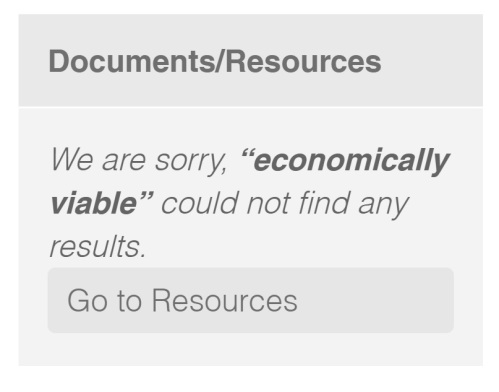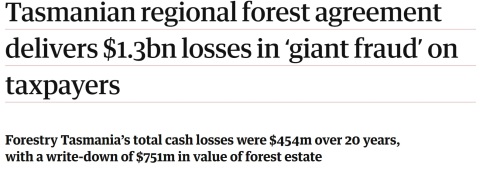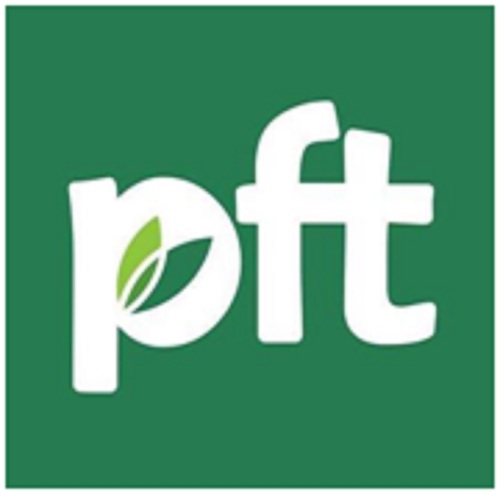The following constitutes my submission to SCS Global Services as part of its assessment of Sustainable Timber Tasmania for FSC Certification.
https://blackwoodgrowers.com.au/2019/04/10/public-notification/

https://au.fsc.org/en-au
https://www.sttas.com.au/
http://www.scsglobalservices.com/
The idea that public native forestry in Tasmania is “environmentally appropriate, socially beneficial and economically viable” (FSC’s very own criteria!) is complete and utter fantasy.
Just the history of the industry over the last 5 years demonstrates the hypocrisy of this idea, never mind the forestry wars of the last 40+ years!!
The above image is taken from the Forest Stewardship Council (FSC) website. Unfortunately none of these three titles on the FSC website are live/linked. You can’t click to find out what the FSC means by “Environmentally Appropriate” or “Economically Viable”. So I typed “Economically Viable” into their search box and I got this result:

FSC “could not find any results”!!
I think the FSC has got some issues to resolve.
Luckily I have a clue as to what the FSC means by “economically viable” from the last time Forestry Tasmania attempted to gain FSC certification. The following quote comes from SCS Global Services website:
Can a company that operates at a loss achieve certification?
The FSC certification standard requires that a forest management entity have sufficient financial resources [taxpayer subsidies] to manage the defined forest area in conformance with the full scope of the standard. The standard does not require that the certified forest is managed at a profit provided that other sources of working capital [taxpayer subsidies] are available and sufficient [$ billions] to enable management in conformance with the standard.
https://www.scsglobalservices.com/news/scs-responds-to-questions-about-the-forestry-tasmania-fsc-forest-management-assessment
So the FSC defines “economically viable” as pretty much anything, including major loss-making public native forestry.
The problem is, under Australian law that is ILLEGAL!!!!!!!
It’s called Competitive Neutrality, and I wrote a blog about it back in 2016:
https://blackwoodgrowers.com.au/2016/10/17/competitive-neutrality-in-forestry/
It is Tasmania’s view that all the State’s PTEs and PFEs, together with its GBEs, are significant Government businesses for the purposes of the CPA. Accordingly, in applying the competitive neutrality principles, significant Government business enterprises are defined as those enterprises which are classified as PTEs, PFEs and/or GBEs.
https://www.economicregulator.tas.gov.au/Documents/Competitive%20Neutrality%20Principles%20Guidelines%20June%201996.pdf
This includes FT/STT.
In 1995 Australia’s governments agreed to the National Competition Policy (NCP) and Related Reforms.
http://ncp.ncc.gov.au/pages/home
The problem is many of those reforms have never been implemented, or have since been watered down.
FT/STT is a classic example!
It was corporatized according to NCP policy, but it has never been run as a commercial business. And yet it competes in the marketplace against private tree growers.
FT/STT has never publically acknowledged that it is a Government business competing in the marketplace against private forest growers both here in Tasmania and on the mainland
FT/STT has never publically acknowledged the need for it to behave in a competitively neutral manner.
FT/STT has never had any Competitive Neutrality Policies and objectives…..ever!
And every week that FT/STT gets another taxpayer handout is another breach of Australia’s Trade Practices Laws.
The fact that FT/STT has never been prosecuted illustrates the broken nature of Australia’s political system, and a conflicted forest industry.
The NCP does not discuss what should be done with Government businesses that cannot survive in a commercial world, businesses like FT/STT.
The FSC does not say where these “other sources” of money may come from or place any limits on the extent of subsidisation.
I wonder what economists think of this idea?
I wonder what private forest owners who compete in the marketplace against loss-making, forest squandering Sustainable Timber Tasmania think of this idea?
So Sustainable Timber Tasmania passes the FSC “economically viable” criteria with flying colors! What a joke!!
Never mind the long suffering Tasmanian taxpayer, or the lowly paid Tasmanian public servant!
The last 20 years
Last year this article appeared in a major Australian news media site detailing the extent of commercial losses from public native forestry in Tasmania:

https://www.theguardian.com/environment/2018/mar/29/tasmanian-forest-agreement-delivers-13bn-losses-in-giant-on-taxpayers
And that analysis was using FT’s own accounting methods!
If FT had to do its accounting like a private forest grower (ie. Competitive neutrality) the losses would be far greater. What private forest grower can value its entire land estate at $0.00??
No doubt the FSC would see this article as glowing praise for world class forest management!!
Greenpeace
The environmental organisation Greenpeace was one of the founding partners of the FSC. In March last year Greenpeace resigned from the FSC citing ongoing and significant issues with the way the FSC was being managed:
https://blackwoodgrowers.com.au/2018/03/30/greenpeace-leaves-the-forest-stewardship-council-fsc/
With Greenpeace gone it now seems that the FSC is moving towards becoming another forest industry rubber stamping organisation like the PEFC.
Buying FSC certified wood products does not save the world’s forests.
New Zealand
Imagine if this response on economic viability was given within a New Zealand context, where the forest industry is fully commercial and profitable?
“Yeah we just waste taxpayers money to grow trees and give them away! Who cares about farmers?”
New Zealand farmers would be marching on their Parliament House to bring down the Government!
Here in Tasmania? Not a whisper of protest!
Bunnings
Bunnings, Australia’s largest timber retailer, is threatening to stop selling public native forest products next year (2020) unless the products achieve FSC certification.
https://blackwoodgrowers.com.au/2018/08/04/bunnings-finally-takes-a-stand/
The marketplace is finally saying “enough is enough”!
For both Vicforests and STT this is crunch time!
Wind up
Four years ago former State politician Sue Smith called for the winding up of FT/STT. How she described the forest industry then is still the same today, but worse.
https://www.themercury.com.au/news/politics/former-mlc-sue-smith-urges-forestry-tasmania-windup/news-story/50272c2ae1798a9358999278b5563073?fbclid=IwAR2YxZMeGSksYF7eI5NxmEmnPxYe2BQ3a8vUdCmr38t1hclWC7tS3JqC-xc
How in anyone’s imagination can this agency achieve FSC certification?
Blackwood
Who is going to grow commercial blackwood when the Tasmania State government and STT waste taxpayers money giving away public native forest blackwood, supported by taxpayer subsidies and the Forest Stewardship Council?
Nothing has changed
Sustainable Timbers Tasmania does not have a business plan, nor does it have commercial objectives.
Neither does it apologise every year for its continuing waste of Tasmanian taxpayers money.
“This is the number of teachers and nurses you missed out on this year thanks to our activities. But don’t worry! We are sustainable!!”
Nothing has changed.
But from my perspective it is the failed economics of public native forestry that is the primary reason that Tasmania will never have a Tasmanian Blackwood Growers Cooperative.
If the FSC “Economic Viability” criteria are so easy to achieve, one must assume the other two criteria – “Environmentally Appropriate” and “Socially Beneficial” – are just a walk in the park!
As a forester I believe this is about the worst possible outcome for the forest industry. It is certainly the worst possible outcome for the Tasmanian community.
- And finally, who gets to pay for STT’s FSC assessment? That’s right! The long suffering Tasmanian taxpayer. Show me a private forest grower who has their FSC assessment paid for by the taxpayer. Answer! NONE!!
PPS. STT is just the forest manager. The State Government owns the forests! The same State Government that wants to log the Tasmanian Wilderness World Heritage Area. The same State Government that IS logging ancient rainforests in Conservation Reserves. For the FSC to certify STT would be an even bigger act of hypocrisy than that of the Tasmanian State Government. The Tasmanian Government determines Forest Policy NOT Sustainable Timbers Tasmania!!
When will Tasmania get a real forest industry based on profitable private tree growers?








The End of Welfare Forestry
The End of Welfare Forestry
Last week the Victorian State Government announced that public native forestry would cease in 2030.
https://www.theguardian.com/australia-news/2019/nov/07/native-forest-logging-to-be-phased-out-by-2030-as-victoria-plans-timber-transition
https://www.theage.com.au/politics/victoria/immediate-end-to-old-growth-logging-as-thousands-of-jobs-set-to-go-20191107-p5388w.html
https://www.abc.net.au/news/2019-11-07/regional-forestry-reax-to-end-of-native-logging-victoria-by-2030/11680544
https://www.theage.com.au/national/victoria/feds-fellers-furious-over-andrews-plan-to-halt-native-forest-logging-20191107-p538e8.html?fbclid=IwAR2AKHO9rL9su9gXOQQoDmx2dklqEKri37rV13oYROEGV90Qq8KKQotGkA4
Victoria, being a relatively progressive State, has been wrestling with the “forestry” issue for decades, with numerous Plans, Strategies, Reports, industry and community consultations, promises and backflips. This was just the latest manifestation:
https://www2.delwp.vic.gov.au/futureforests
The public native forest industry has been in decline for decades, but the industry wants to ensure that the end, when it comes, is as slow, painful and costly as possible.
Forest industry apologists bleat about how vital public native forestry is to the future of humanity!! Apparently the world will end if we stop chopping down public native forest.
Industry apologists also love talking about “balance”; that there is a balance between conservation and exploitation of our native forests. The industry has in the past attempted to impose a “balance” on our forests but without success.
Why?
Because public native forestry is 100% politics. To say there is a “balance” in public native forestry is to say there is a “balance” in politics! There is no such thing!
Does anyone believe 2030 will be the year welfare forestry ends?
Not likely. There are plenty of elections between now and then with plenty of changes of Government.
But this is definitely another nail in the coffin of the industry.
The only reason Victoria logs public native forest is to subsidise a few jobs. It is a very expensive wasteful employment program. That is all!
Private tree growers do NOT grow trees to subsidise jobs.
Public native (Welfare) forestry prevents a real forest industry from becoming established in Australia.
As a forester I look forward to the day Australia finally has a real forest industry.
Share this:
Like this:
Related